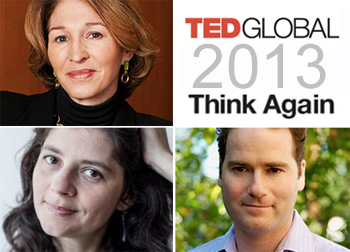 Three fascinating speakers have been added to the lineup for TEDGlobal 2013, which kicks off in Edinburgh, Scotland, June 10 to 14.
Three fascinating speakers have been added to the lineup for TEDGlobal 2013, which kicks off in Edinburgh, Scotland, June 10 to 14.
First, Anne-Marie Slaughter, who exploded the conversation about women’s work-life balance with her July/August 2012 The Atlantic article, “Why Women Still Can’t Have It All,” will join the conference to lend her expertise on policy and work. Slaughter, who’ll become president of the New America Foundation in September, will speak during session 1, “The Moment of Truth.”
Brazilian neuroscientist Suzana Herculano-Heuzel will also take the TEDGlobal stage. Herculano-Heuzel created “brain soup” in order to count the number of neurons in the human brain. She will speak during session 5, “Listening to Nature,” as her latest work has her studying elephant and whale brains.
The final new addition to the program: Andras Forgacs, the co-founder and CEO of Modern Meadow, a company which is “bio-printing” meat and leather. In other words: no animal will be killed in the making of the final consumer products.
See the full lineup of speakers, and read their detailed bios.
The 70+ presenters at TEDGlobal 2013 are an enthralling bunch. Here’s a look at some of the other speakers who’ve been in the news recently.
- What, you ask, is an “airborne ecologist?” Last week, The Economist took a look at Gregory Asner’s work studying the hunting patterns of lions from a twin propeller plane. What is the benefit? The ability to make a 3D map of an area and chart animal movement through it — without having to catch animals in the act.
- Economist Dambiso Moyo, the author of Dead Aid who most recently turned her eye to China’s race for resources, was named the winner of the 2013 Hayek Lifetime Achievement Award this week. She follows in the footsteps of TEDGlobal 2011 speaker Niall Ferguson, who also wrote the foreword to her most well-known book.
- Shereen El Feki’s new book, Sex and the Citadel, was reviewed last week by Janet Maslin of The New York Times. Maslin writes, “Though she warns her readers that she is not writing an encyclopedia or staging a peep show, Ms. El Feki does ask an array of highly personal questions about present-day sexual relations in Muslim societies, with particular emphasis on Egypt, Tunisia, Lebanon, the United Arab Emirates and Morocco.”
- Financial Times interviewed Michael Sandel over a seafood lunch in a piece subtitled, “The Harvard philosopher and ‘moral rock star’ on Obama, education’s new frontiers and the shortcomings of markets.” In a great moment in the interview, Sandel shares why thousands of people attend his lectures: “There is an enormous hunger to engage in big questions that matter,” he says.
- On March 30, The New York Times ran a story on behavioral economist Allessandro Acquisti, who looks at the vast wealth of information we give away online without even realizing it. Thing to note: by posting a photo online, you actually give out clues to your social security number.
- “You know when you have a bird, and it’s been in a cage all its life? When you open the cage door, it doesn’t want to leave. It was that moment.” Women’s rights activist Manal Al-Sharif quoted in a recent The Wall Street Journal profile describing how she felt the first time she got behind the wheel of a car in Saudi Arabia.
- Plutocrats author Chrystia Freeland wrote an op-ed for Reuters last week called “The sorrow and the pity of Obama’s budget.”
- Reviewer Hari Kunzru of The New York Times mentions Lesley Hazleton’s first TED Talk, “On reading the Koran,” in his review of her new book, a biography of Muhammad. He writes, “Hazleton approaches her subject with scrupulous respect … In 2010, she gave a TED talk debunking some of the more egregious myths about the Koran, notably the salaciously Orientalist ‘72 virgins.’ This is a writer who is working to dispel contradictions, not sharpen them.”
- A study on whether false memories can curb a person’s desire to drink alcohol by Elizabeth Loftus was featured on TIME.com last week.
We can’t wait for these speakers to make us “Think Again” at TEDGlobal 2013.
Comments